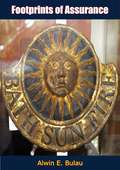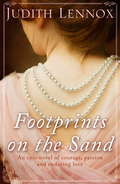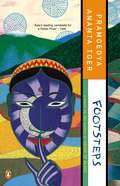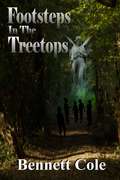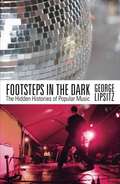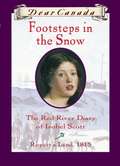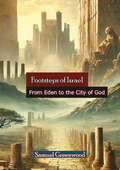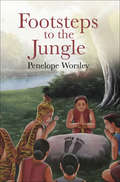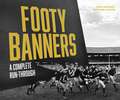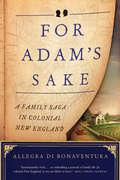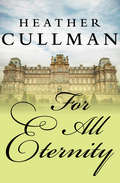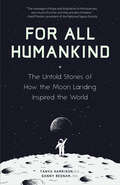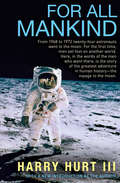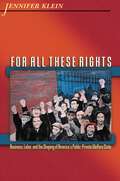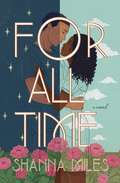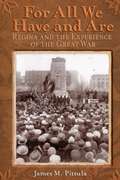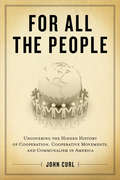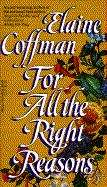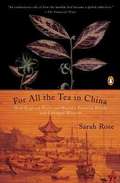- Table View
- List View
Footprints of Assurance
by Alwin E. BulauFOOTPRINTS OF ASSURANCE is a comprehensive and complete record of fire marks used by fire insurance companies in sixty-three countries. These insignia themselves tell the story of the development of one of the world’s most important economic institutions.Mr. Bulan enriches the story by introducing the reader to some of the men who have been responsible for the growth of the institution. He has enlivened his account with incident and anecdote so that the lay reader may share with the profession an understanding of the spirit which has from the beginning been the distinguishing feature of the enterprise of providing security against loss by fire.Collectors of fire marks will find this volume to be an indispensable guide. Economic historians will not find anywhere so full a record of these signs of security, these visible symbols of assurance, assurance which provided the climate requisite to economic growth.The volume shows nearly 1800 fire marks in half tone vignettes each with a caption giving a full description of the mark and date of organization of each company. This systematic treatment has indeed established the collecting of marks as a science and has added to the English language the word Signeviery as the name of that science.
Footprints on the Sand: An epic novel of courage, passion and enduring love
by Judith Lennox'I have fallen completely in love with Judith Lennox's writing - she's a fantastic storyteller!' Jill Mansell With the onset of war, everything changes... Judith Lennox writes an unforgettable novel of enduring love and the tides of fortune in the compelling novel Footprints on the Sand. Perfect for fans of Dinah Jefferies and Lucinda Riley.The Mulgraves are a rootless, bohemian family who travel the continent, staying in crumbling Italian palazzos, Spanish villas, French vineyards - belonging nowhere, picking up friends and hangers-on as they go, and moving on when Ralph Mulgrave's latest enthusiasm dwindles. Faith, the eldest child of the family, longs for a proper home. But in 1940, Germany invades France and the Mulgraves are forced to flee to England. Faith and her brother Jake go to London, while Ralph reluctantly settles in a Norfolk cottage with the remnants of his family.In the intense and dangerous landscape of wartime London Faith finds work as an ambulance driver, and meets once again one of Ralph's retinue from those distant and, in retrospect, golden days of childhood. Through war and its aftermath, it is Faith on whom the family relies, Faith who offers support and succour, and Faith who is constant and true in her love. What readers are saying about Footprints on the Sand: 'Curl up and get lost in this wonderfully written book that takes you from early 1900 through to the 1960s''[Judith Lennox] can paint a picture so vividly in your mind, make you care about her characters, make you feel the anguish, the partings, the love that is taken away and then given back. A wonderful read''Such wonderful escapism - well written and compelling!'
Footprints on the Sand: An epic novel of courage, passion and enduring love
by Judith LennoxThe Mulgraves are a rootless, bohemian family who travel the continent, staying in crumbling Italian palazzos, Spanish villas, French vineyards - belonging nowhere, picking up friends and hangers-on as they go, and moving on when Ralph Mulgrave's latest enthusiasm dwindles. Faith, the eldest child of the family, longs for a proper home. But in 1940 Germany invades France and the Mulgraves are forced to flee to England. Faith and her brother Jake go to London while Ralph reluctantly settles in a Norfolk cottage with the remnants of his family. In the intense and dangerous landscape of wartime London Faith finds work as an ambulance driver, and meets once again one of Ralph's retinue from those distant and, in retrospect, golden days of childhood. Through war and its aftermath, it is Faith on whom the family relies, Faith who offers support and succour, and Faith who is constant and true in her love.
Footprints on the Sands of Time: RAF Bomber Command Prisoners of War in Germany 1939–1945
by Oliver Clutton-BrockThe author of RAF Evaders provides a comprehensive reference of the airmen of Bomber Command who were held in German captivity during WWII. This extensive book is divided into two part. The first, which has eighteen chapters, deals with German POW camps as they were opened, in chronological order and to which the Bomber Command POWs were sent. Each chapter includes anecdotes and stories of the men in the camps—capture, escape, illness, and murder—and illustrates the awfulness of captivity even in German hands. Roughly one in every twenty captured airmen never returned home. The first part also covers subjects such as how the POWs were repatriated during the war; how they returned at war&’s end; the RAF traitors; the war crimes; and the vital importance of the Red Cross. The style is part reference, part gripping narrative, and the book will correct many historical inaccuracies, and includes previously unpublished photographs. The second part comprises an annotated list of ALL 10, 995 RAF Bomber Command airmen who were taken prisoner, together with an extended introduction. The two parts together are the fruit of exhaustive research and provide an important contribution to our knowledge of the war and a unique reference work not only for the serious RAF historian but for the ex-POWs themselves and their families and anyone with an interest in the RAF in general and captivity in particular.
Footsteps
by Pramoedya Ananta Toer Max LaneAs the world moves into the twentieth century, Minke, one of the few European-educated Javanese, optimistically starts a new life in a new town: Betawi. With his enrollment in medical school and the opportunity to meet new people, there is every reason to believe that he can leave behind the tragedies of the past. But Minke can no more escape his past than he can escape his situation as part of an oppressed people under a foreign power. As his world begins to fall apart, Minke draws a small but fervent group around him to fight back against colonial exploitation. During the struggle, Minke finds love, friendship, and betrayal--with tragic consequences. And he goes from wanting to understand his world to wanting to change it. Pramoedya's full literary genius is again evident in the remarkable characters that populate the novel--and in his depiction of a people's painful emergence from colonial domination and the shackles of tradition.
Footsteps in Treetops
by Bennett ColeMurdered! Yes, murdered! Her body left lying on the Wildwood Trail.In Radnor, a small Virginia mountain town, twelve-year-old Marvin McKenzie and his Junior Commando gang attempt to lead normal lives on the homefront as WWII rages on. But their peace is fractured when one of the gang finds the body on the Wildwood Trail, the kids' favorite haunt.When the older brother of one of the gang's members is erroneously charged with the murder, the Commandos resolve to try to "crack the case." But the intrusion in Marvin's life caused by an "older" (fourteen) precocious neighborhood girl, her alcoholic father and her terminally ill and demented grandmother, coupled with various Commando escapades, temporarily sidetrack Marvin and his cohorts.
Footsteps in the Dark: The Hidden Histories of Popular Music
by George LipsitzMost pop songs are short-lived. They appear suddenly and, if they catch on, seem to be everywhere at once before disappearing again into obscurity. Yet some songs resonate more deeply—often in ways that reflect broader historical and cultural changes. <p><p> In Footsteps in the Dark, George Lipsitz illuminates these secret meanings, offering imaginative interpretations of a wide range of popular music genres from jazz to salsa to rock. Sweeping changes that only remotely register in official narratives, Lipsitz argues, can appear in vivid relief within popular music, especially when these changes occur outside mainstream white culture. Using a wealth of revealing examples, he discusses such topics as the emergence of an African American techno music subculture in Detroit as a contradictory case of digital capitalism and the prominence of banda, merengue, and salsa music in the 1990s as an expression of changing Mexican, Dominican, and Puerto Rican nationalisms. Approaching race and popular music from another direction, he analyzes the Ken Burns PBS series Jazz as a largely uncritical celebration of American nationalism that obscures the civil rights era’s challenge to racial inequality, and he takes on the infamous campaigns to censor hip-hop and the radical black voice in the early 1990s. <p><p> Teeming with astute observations and brilliant insights about race and racism, deindustrialization, and urban renewal and their connections to music, Footsteps in the Dark puts forth an alternate history of post–cold war America and shows why in an era given to easy answers and clichéd versions of history, pop songs matter more than ever. <p><p> George Lipsitz is professor of black studies and sociology at the University of California, Santa Barbara. Among his many books are Life in the Struggle, Dangerous Crossroads, and American Studies in a Moment of Danger (Minnesota, 2001).
Footsteps in the Snow: The Red River Diary of Isobel Scott
by Carol MatasIsobel thinks that she and her family will find their fortune in Canada. But Isobel's mother dies before they even cross the ocean, and other misfortunes follow their every step.
Footsteps of Israel: From Eden to the City of God
by Samuel GreenwoodFootsteps of Israel: From Eden to the City of God by Samuel Greenwood offers a sweeping narrative of humanity’s spiritual journey, tracing the biblical story of Israel from the creation of Eden to the ultimate fulfillment of divine promises in the City of God. Greenwood’s work is both a historical reflection and a theological exploration, weaving together themes of faith, redemption, and God’s enduring covenant with His people.The book examines the key moments in Israel’s history, starting with the fall of humanity in Eden and progressing through pivotal events such as the calling of Abraham, the Exodus from Egypt, the reigns of the kings, and the prophetic promises of restoration. Greenwood emphasizes how each step of Israel’s journey reflects universal spiritual principles, showing how God’s guidance and grace are available to all people, not just one nation.Greenwood delves into the deeper meaning of Israel’s struggles, triumphs, and failures, drawing lessons applicable to modern believers. He presents Israel’s story as a spiritual metaphor for the progress of every soul—from the challenges of sin and exile to the hope of reconciliation with God. Throughout the book, Greenwood also reflects on the ultimate promise of the City of God, a symbolic representation of divine harmony and the fulfillment of God’s plan for humanity.Written with clarity and reverence, Footsteps of Israel appeals to readers interested in biblical history, theology, and the journey of faith. It offers a hopeful message, emphasizing that the spiritual truths revealed through Israel’s story remain relevant to believers today. Greenwood’s work invites readers to view their own lives as part of a greater spiritual pilgrimage, encouraging them to walk in faith toward the City of God—a place of peace, renewal, and eternal connection with the divine.
Footsteps to the Jungle
by Penelope WorsleyBorn in Cairo in 1942, Penelope married Oliver Worsley and went to live in Yorkshire, where they had four children. Footsteps to the Jungle traces Penelopes earlier life, the discovery of Huntingtons Disease, the death of her son Richard and what led her to set up an international charity in his memory. The Karen Hilltribes Trust is focused on helping the Karen people in the mountainous area of northwest Thailand to help themselves to build a better future. This illustrated book is a personal story that shares tragedy, illness and challenges, resulting in the huge rewards of working with others
Footy Banners: A Complete Run-Through
by Leigh Meyrick Matthew HagiasCelebrating one of AFL's longest-standing and most iconic traditions Have you ever wondered what makes Australian Rules Football so unique? Sure, the rules are unmistakably different to other sports, but it's the bizarre traditions and idiosyncrasies that make the game uniquely ours. One of those quirks is the team banner – an essential element of the pre-match build-up that has connected fans with their heroes for more than 80 years. The humble banner, or run-through as it's known by the purists, has become an iconic symbol of our love for the game. It's why cheer squads around the country dedicate countless hours each and every week to delicately craft their messages on crepe. This painstaking process culminates in a fleeting moment of glory as the teams run onto the ground before the banner is torn (quite literally) to shreds. From the funny to the offensive, the emotional to the political, banners come in all shapes and sizes and have evolved considerably, reflecting not only a changing cultural landscape but a changing game itself. Footy Banners: A Complete Run-Through is a collection of historical images, stories and unforgettable moments that pay homage to one of our game's longest-lasting rituals.
For Adam's Sake: A Family Saga in Colonial New England
by Allegra Di Bonaventura"Incomparably vivid . . . as enthralling a portrait of family life [in colonial New England] as we are likely to have."--Wall Street Journal In the tradition of Laurel Thatcher Ulrich's classic, A Midwife's Tale, comes this groundbreaking narrative by one of America's most promising colonial historians. Joshua Hempstead was a well-respected farmer and tradesman in New London, Connecticut. As his remarkable diary--kept from 1711 until 1758--reveals, he was also a slave owner who owned Adam Jackson for over thirty years. In this engrossing narrative of family life and the slave experience in the colonial North, Allegra di Bonaventura describes the complexity of this master/slave relationship and traces the intertwining stories of two families until the eve of the Revolution. Slavery is often left out of our collective memory of New England's history, but it was hugely impactful on the central unit of colonial life: the family. In every corner, the lines between slavery and freedom were blurred as families across the social spectrum fought to survive. In this enlightening study, a new portrait of an era emerges.
For All Eternity (The Sommerville Novels #1)
by Heather CullmanDesperate circumstances force a willful Regency heiress to become a servant at a grand country estate, where she finds herself in the employ of the nobleman she once scorned With all of London at her feet, Sophie Barrington could have any man she desires. But the pampered heiress is in love with the foppish Julian, Lord Oxley, and is completely uninterested in the man her family is pressuring her to wed--Nicholas Somerville, the wealthy Earl of Lyndhurst. Then she discovers why her family is so set on Nicholas: She's penniless. She must either marry the odious Lord Lyndhurst or face debtor's prison. A clever scheme to save herself erupts in scandal, forcing her to flee town. Nicholas always imagined that the wife he chose would possess sense and sensibility. Instead, he finds himself courting a spoiled society chit who's far too beautiful for her own good. When Sophie publicly humiliates him, Nicholas returns to his ancestral manor to regroup. There he discovers that the newest servant at Hawksbury Manor is the object of his desire--and mortification--and he plots to pay her back. Witty, sensual, and filled with powerful emotion, For All Eternity is romance at its most beguiling.
For All Humankind: The Untold Stories of How the Moon Landing Inspired the World
by Tanya Harrison Danny BednarStories of the first moon landing as experienced by real people from around the world—great for fans of A Man on the Moon, Rocket Men, or First Man. Astronauts Neil Armstrong and Edwin &“Buzz&” Aldrin left humanity&’s first footprints on the Moon, July 20, 1969. The plaque they left behind reads, &“Here men from the planet Earth first set foot upon the Moon, July 1969, A.D. We came in peace for all mankind.&” But was the Apollo 11 moon landing mission really a global endeavor? How did people outside the United States view these &“rocket men?&” Against the political backdrop of the Cold War between the United States and the Soviet Union, was it, indeed, &“For all mankind?&” Dr. Tanya Harrison and Dr. Danny Bednar have talked to individuals from a variety of locations outside the United States, to see how this event touched the lives of people across the world. Enthusiasts of space travel, the Apollo missions, and the moon landings will love this book. These previously untold stories reveal the impact of the moon landings around the globe, and what having a &“man on the moon&” meant to the international community. In this exciting book, readers will:· Find interviews with eight non-Americans to get their perspectives· Be inspired by their memories of the event· Learn more about one of the most historic events in human history&“An absolute delight! By telling the story of the 1969 Apollo 11 moon landing through the eyes of observers from around the world, [Harrison and Bednar] bring freshness to it that is utterly beguiling.&”—Dr. Andrew Maynard, author of Films from the Future and Future Rising
For All Mankind
by Harry Hurt III&“Far more than a history of lunar exploration . . . [Hurt] is at his best in the deft sketches of the astronauts—as they were and as they became.&”—Chicago Tribune Between December 1968 and December 1972, twenty-four men captured the imagination of the world as they voyaged to the moon. In For All Mankind, Harry Hurt III presents a dramatic, engrossing, and expansive account of those journeys. Based on extensive research and exclusive interviews with the Apollo astronauts, For All Mankind remains one of the most comprehensive and revealing firsthand accounts of space travel ever assembled. In their own words, the astronauts share the sights, sounds, thoughts, fears, hopes, and dreams they experienced during their incredible voyages. In a compelling narrative structured as one trip to the moon, Harry Hurt recounts all the drama and danger of the lunar voyages, from the anxiety of the astronauts&’ prelaunch procedures through the euphoria of touchdown on the lunar surface. Updated with a new introduction by the author for the 50th anniversary of the Apollo 11 moon landing, For All Mankind is both an extraordinary adventure story and an important historical document. &“Hurt&’s timely book is like an instant replay of the dramatic moon flight years . . . Hurt tells us of the hardships and the successes of the Apollo program, the remarkable journey to the moon, of the astronauts and technicians who made it possible and the goals of the nation in space.&”—Houston Chronicle &“The meat here lies in the lunar voyage itself, an irresistible mix of danger, courage, tedium, and spectacle, evoked with unprecedented detail by those who went there.&”—Kirkus Reviews
For All These Rights: Business, Labor, and the Shaping of America's Public-Private Welfare State (Politics and Society in Modern America #20)
by Jennifer KleinThe New Deal placed security at the center of American political and economic life by establishing an explicit partnership between the state, economy, and citizens. In America, unlike anywhere else in the world, most people depend overwhelmingly on private health insurance and employee benefits. The astounding rise of this phenomenon from before World War II, however, has been largely overlooked. In this powerful history of the American reliance on employment-based benefits, Jennifer Klein examines the interwoven politics of social provision and labor relations from the 1910s to the 1960s. Through a narrative that connects the commercial life insurance industry, the politics of Social Security, organized labor's quest for economic security, and the evolution of modern health insurance, she shows how the firm-centered welfare system emerged. Moreover, the imperatives of industrial relations, Klein argues, shaped public and private social security. Looking closely at unions and communities, Klein uncovers the wide range of alternative, community-based health plans that had begun to germinate in the 1930s and 1940s but that eventually succumbed to commercial health insurance and pensions. She also illuminates the contests to define "security"--job security, health security, and old age security--following World War II. For All These Rights traces the fate of the New Deal emphasis on social entitlement as the private sector competed with and emulated Roosevelt's Social Security program. Through the story of struggles over health security and old age security, social rights and the welfare state, it traces the fate of New Deal liberalism--as a set of ideas about the state, security, and labor rights--in the 1950s, the 1960s, and beyond.
For All Time
by Parris Afton BondsSHE WAS SWEPT BACK MORE THAN A CENTURY From the moment Stacie Brannigan discovered her great- grandmother's diary, she knew her life would never be the same. Haunted by visions of long ago, Stacie suddenly found herself drawn back in time to nineteenth-century Texas. There, on the rugged plains, she was reborn as a daring frontiers- woman and surrendered--body and soul--to a handsome stranger whose forbidden caresses ignited a passion she'd never known. Her name was Anastasia Wysse, a headstrong Swedish beauty who'd settled in Texas in the 1870s. He was Joseph Muldoon, a noble half-breed who could never be hers. Star- crossed lovers, they would risk their lives and defy destiny for a love that would burn ... For All Time.
For All Time
by Shanna Miles&“An unforgettable and artfully crafted romance right down to the very last page.&” —Julie Murphy, #1 New York Times bestselling author of Dumplin&’ &“A romance for the ages. Fresh voices and original predicaments make this one perfect little novel.&” —Stacey Lee, award-winning author of The Downstairs Girl The Sun Is Also a Star meets Outlander in this vivid, utterly romantic debut novel about two teens who relive their tragic love story over and over until they uncover what they must do to change their fate.Tamar is a musician, a warrior, a survivor. Fayard? He&’s a pioneer, a hustler, a hopeless romantic. Together, Tamar and Fayard have lived a thousand lives, seen the world build itself up from nothing only to tear itself down again in civil war. They&’ve even watched humanity take to the stars. But in each life one thing remains the same: their love and their fight to be together. One love story after another. Their only concern is they never get to see how their story ends. Until now. When they finally discover what it will take to break the cycle, will they be able to make the sacrifice?
For All Waters: Finding Ourselves in Early Modern Wetscapes
by Lowell DuckertRecent years have witnessed a surge in early modern ecostudies, many devoted to Shakespearean drama. Yet in this burgeoning discipline, travel writing appears moored in historicization, inorganic subjects are far less prevalent than organic ones, and freshwater sites are hardly visited. For All Waters explores these uncharted wetscapes. Lowell Duckert shows that when playwrights and travel writers such as Sir Walter Raleigh physically interacted with rivers, glaciers, monsoons, and swamps, they composed &“hydrographies,&” or bodily and textual assemblages of human and nonhuman things that dissolved notions of human autonomy and its singular narrativity. With a playful, punning touch woven deftly into its theoretical rigor, For All Waters disputes fantasies of ecological solitude that would keep our selves high and dry and that would try to sustain a political ecology excluding water and the poor. The lives of both humans and waterscapes can be improved simultaneously through direct engagement with wetness. For All Waters concludes by investigating waterscapes in peril today—West Virginia&’s chemical rivers and Iceland&’s vanishing glaciers—and outlining what we can learn from early moderns&’ eco-ontological lessons. By taking their soggy and storied matters to heart, and arriving at a greater realization of our shared wetness, we can conceive new directions to take within the hydropolitical crises afflicting us today.
For All We Have and Are: Regina and the Experience of the Great War
by James M. PitsulaThe First World War profoundly affected every community in Canada. In Regina, the politics of national identity, the rural myth, and the social gospel all lent a distinctive flavour to the city’s experience of the Great War. For many Reginans, the fight against German militarism merged with the struggle against social evils and the “Big Interests,” adding new momentum to the forces of social reform, including the fights for prohibition and women’s suffrage.James M. Pitsula traces these social movements against the background of the lives of Regina men who fought overseas in battles such as Passchendaele and Vimy Ridge. Skillfully combining vivid detail with the larger social context, For All We Have and Are provides a nuanced picture of how one Canadian community rebuilt both its realities and myths in response to the cataclysm of the “war to end all wars.”
For All the People: Uncovering the Hidden History of Cooperation, Cooperative Movements, and Communalism in America
by John CurlSeeking to reclaim a history that has remained largely ignored by most historians, this dramatic and stirring account examines each of the definitive American cooperative movements for social change—farmer, union, consumer, and communalist—that have been all but erased from collective memory. Focusing far beyond one particular era, organization, leader, or form of cooperation, the expansive analysis documents the multigenerational struggle of the American working people for social justice. With an expansive sweep and breathtaking detail, the chronicle considers Native American times and follows the American worker from the colonial workshop to the modern mass-assembly line, ultimately painting a vivid panorama of those who built the United States and those who will shape its future.
For All the Right Reasons
by Elaine CoffmanMaster storyteller Elaine Coffman spins a wondrous tale of an unforgettable Texas heroine. Katherine Simon has never stopped loving her childhood sweetheart, not even after he comes home from war determined to marry another woman-her pretty, pampered sister, Karin. But all will change with the cry of "Gold!" from California-a call for a reckless young man to make fortune and for an irrepressible woman to make a daring journey of the heart.
For All the Tea in China: How England Stole the World's Favorite Drink and Changed History
by Sarah RoseJournalist Sarah Rose presents a dramatic historical narrative of the man who stole the secret of tea from China.
For Anarchism: History Theory And Practice (Routledge Library Editions: Anarchy)
by David GoodwayThis collection discusses both the history and theory of anarchism and in particular examines italian anarchism, the relationship between Marxism and anarchism, the influence of Kropotkin, new social movements and the anarchist theory of history.
For Better or For Worse? Collaborative Couples in the Sciences
by Annette Lykknes Donald L. Opitz Brigitte Van TiggelenIn this volume, a distinguished set of international scholars examine the nature of collaboration between life partners in the sciences, with particular attention to the ways in which personal and professional dynamics can foster or inhibit scientific practice. Breaking from traditional gender analyses which focus on divisions of labor and the assignment of credit, the studies scrutinize collaboration as a variable process between partners living in the nineteenth and twentieth centuries who were married and divorced, heterosexual and homosexual, aristocratic and working-class and politically right and left. The contributors analyze cases shaped by their particular geographical locations, ranging from retreat settings like the English countryside and Woods Hole, Massachusetts, to university laboratories and urban centers in Berlin, Stockholm, Geneva and London. The volume demonstrates how the terms and meanings of collaboration, variably shaped by disciplinary imperatives, cultural mores, and the agency of the collaborators themselves, illuminate critical intellectual and institutional developments in the modern sciences.
